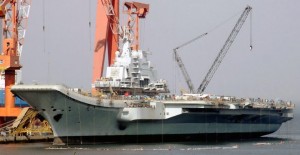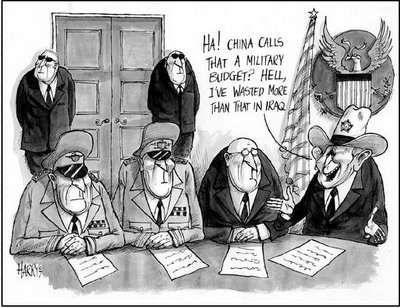In fact, American foreign policy has long been characterized by insidious hypocrisy and egregious double standards. And nothing demonstrates these features quite like the Bush Administration insinuating that China is becoming a regional and international menace because it has budgeted $45 billion in military expenditures for fiscal 2007. After all, Bush has budgeted $625 billion to feed America’s military industrial complex for this same year….
(Who says America is concerned about China’s booming military, The iPINIONS Journal, March 11, 2007)
This was how I attempted to put into perspective media reports four years ago which made it seem as though finding out about China’s military expenditures was tantamount to discovering a secret plan to invade United States. Now the media are inciting more irrational fear after finding out that China is poised to launch its first aircraft carrier.
Granted, China gave credence to this fear by misleading Western governments (principally the United States) into thinking that it was only building a floating casino to launch in Macau, the gambling Mecca of Asia. But, ironically, I have no doubt that China engaged in this irrational subterfuge primarily to avoid inciting irrational fear in the U.S. about the growth of its military. And so it goes….
Nevertheless, just as I did before, I feel obliged to note that much of the reporting on China’s first aircraft carrier fails to mention that the United States already has eleven of them. Even Italy and Spain each have two. By contrast, when it launches its carrier, China will join Russia, India, Brazil, Thailand, France, and England with just one.
All of the great nations in the world own aircraft carriers – they are symbols of a great nation.
(Lt Gen Qi Jianguo, assistant chief of the PLA general staff, BBC, June 8, 2011)
 Indeed, it could be that China is looking to do nothing more than flaunt its new-found greatness. The effect however is that this carrier will enable China to better exert sovereign control over the South China Sea – at the expense of countries like Vietnam with whom it is embroiled in an increasing bellicose dispute over fishing as well as oil and gas exploration rights.
Indeed, it could be that China is looking to do nothing more than flaunt its new-found greatness. The effect however is that this carrier will enable China to better exert sovereign control over the South China Sea – at the expense of countries like Vietnam with whom it is embroiled in an increasing bellicose dispute over fishing as well as oil and gas exploration rights.
Still, there’s no denying that this carrier will imbue China’s more nationalistic citizens with naval pride. But the point here is that possessing one has not made any of the countries in the aircraft-carrier club a menace on the High Seas.
Which therefore begs the question: why all the hysteria about China’s?
Well, for starters, none of these other countries are threatening to rival the United States as the world’s only superpower. And here, for example, is how I illustrated more than six years ago the worry this portends:
What happens if China decides that it’s in its strategic national interest to convert the container ports, factories and chemical plants it has funded throughout the Caribbean into dual military and commercial use? Would these governments comply? Would they have any real choice? And when they do comply, would the U.S. then blockade the entire region – as it blockaded Cuba during the missile crisis?
Now, consider China making such strategic moves in Latin America where its purportedly benign Yuan diplomacy dwarfs its Caribbean operations. This new Cold War could then turn very hot indeed….
(China buying up political dominion, The iPINIONS Journal, February 22, 2005)
That said, I feel equally obliged to note that even if China were to use this aircraft carrier to flex its new military might around the world, it would merely be doing what the United States has been doing with self-righteous hegemony for decades.
Of course, some would argue that China incites this kind of irrational fear not just because of its human rights abuses, including most notoriously its crackdown on democratic protesters in Tiananmen Square, but also because of its stomping all over the democratic aspirations of Tibetan monks.
But I would counter that the human rights abuses China committed against democratic protesters in the late 1980s were not nearly as inhumane as those the Untied States committed against Blacks in the early 1960s. Furthermore, that China’s incursion into Tibet was not nearly as willful a flouting of international law as the U.S.’s invasion of Iraq.
 Incidentally, I would also remind those condemning China for failing to even voice support for the democratic uprisings across the Arab world this spring that at least this was consistent with its core values: It would’ve been beyond hypocritical after all for China to call for democracy in the Arab world after squashing it as an existential threat at home. That’s the kind of moral hypocrisy Iran displays.
Incidentally, I would also remind those condemning China for failing to even voice support for the democratic uprisings across the Arab world this spring that at least this was consistent with its core values: It would’ve been beyond hypocritical after all for China to call for democracy in the Arab world after squashing it as an existential threat at home. That’s the kind of moral hypocrisy Iran displays.
More to the point, though, one could just as easily condemn the United States for preaching about democracy and human rights while propping up dictators across the Arab world. This is why democratic protesters from Egypt to Libya can be forgiven for having nothing but contempt for the United States for voicing support for their cause so begrudgingly.
At any rate, the above should provide some insight into the flagrant double standards that abound in the west when it comes to judging anything China does, especially militarily. Frankly, I couldn’t care any less if China’s (not so secret) ambition is to build a military industrial complex to rival that of the United States I just hope it is smart enough to be guided by the cautionary precedent the Soviet Union set by relying too heavily on military might for its superpower status.
Apropos of this, given the relatively small amount it is spending on its military, China seems to fully appreciate that having a superpower economy and an ordinary military is far more sustainable than vice versa – as the Soviet Union found out.
On the other hand, the United States seems blithely unconcerned about this foreboding precedent. Only this explains the way it is turning its superpower economy into an ordinary one with spendthrift military adventures (like those in Afghanistan, Iraq, Libya and now Yemen), all of which benefit only a few war profiteers. But the categorical imperative of managing this symbiotic relationship between economic and military power couldn’t be any clearer.
Apropos of the United States spending way beyond its means, the March 10, 2011, edition of CNN quotes no less a person than US Chairman of Joint Chiefs Adm. Mike Mullen saying that:
The world’s biggest debtor nation cannot remain the world’s sole superpower indefinitely.
In any case, please do not extrapolate from my support for China’s unconditional right to build and flex its military might support for China in any other respect. Because in a bipolar world where China and the United States rule, I would declare my support for the U.S. quite unabashedly.
Actually, I don’t know anyone who’d rather live in a world dominated by Chinese values and influence than in one dominated by American values and influence. Do you?
Related commentaries:
China buying dominion…
Who says America is concerned…
Punishing China…Hardly
Obama upsetting liberals
Tibet – China’s Buddhist intifada…
